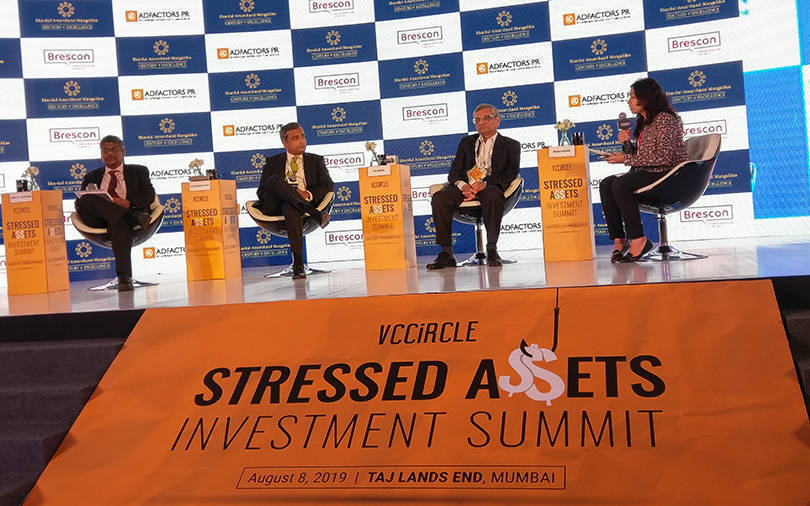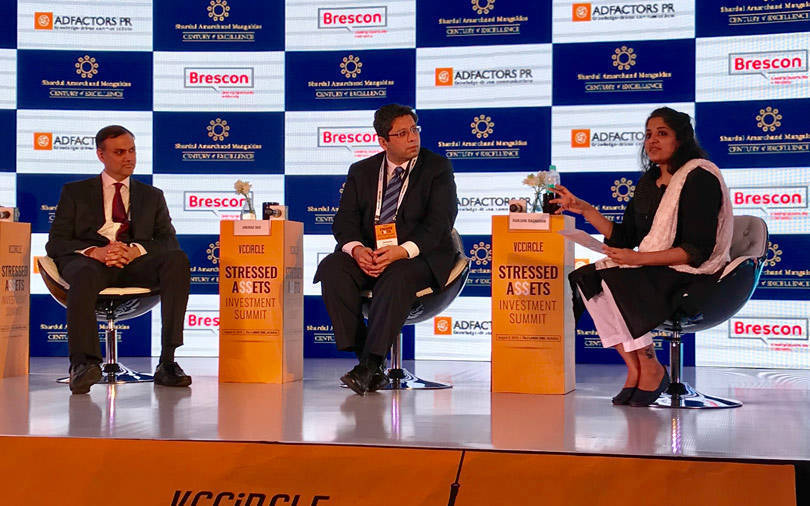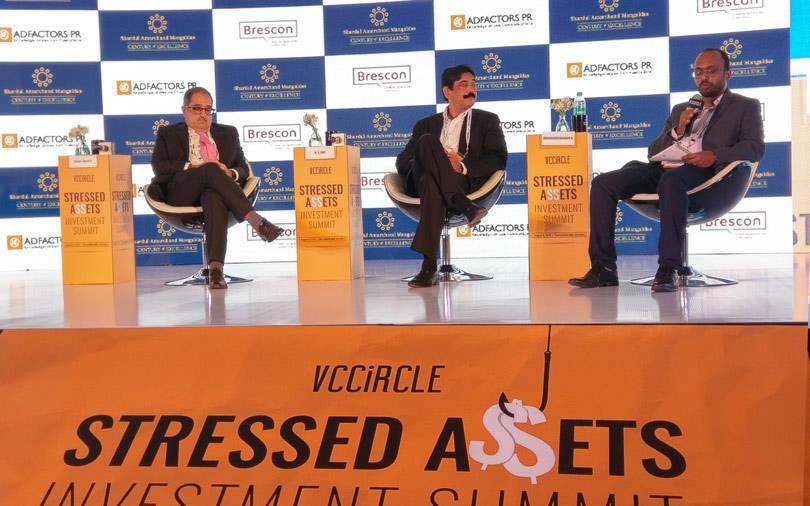Stressed assets have dominated headlines for the past couple of years, as banks struggle with $150 billion of bad loans. And while banks are dragging defaulters to courts under the Insolvency and Bankruptcy Code, more than half of these cases remain unresolved.
There might be a silver lining though, as the ratio of bad loans has started falling a tad. Also, companies and creditors are now thinking of solutions outside the bankruptcy process.
So, how has the bankruptcy law really performed thus far? What are the strategies that interested buyers are adopting? And what challenges are the creditors facing?
To discuss these issues, Mosaic Digital, the corporate banner behind VCCircle, is organising the third edition of its Stressed Assets Investment Summit in Mumbai.

The event got underway on Thursday morning. Here's all the action as it happened:
1:45 PM: The last panel discussion concludes and the participants head for lunch.
1:40 PM: Shardul Amarchand's Rawat asks the two panellists how to get all lenders to sign the inter-creditor agreement.
To this, Chachra said if the lenders are unable to reach a decision, the RBI should force them to sell all their loans to ARCs.
1:34 PM: Diwanji also said that pre-packaged deals also have a lot of dilemma, because lenders are taking haircuts while promoters are creating equity value.
We should see many pre-packaged deals happen over the next six months, he said.
1:30 PM: Chachra said the IBC is a cleansing process. Diwanji concurred, saying it is a much better law than previous laws.
1:26 PM: Diwanji said prospective suitors should not bid if there is inadequate information.
However, some times inadequate information is just an excuse and the real reason is that the bidder does not have enough money to buy the asset.
1:22 PM: Replying to a question on whether the quality of information in bid documents leads to delays, Chachra said bidders don't need a lot of information on a bankrupt company.
Information is available to lenders, and the easiest thing the Insolvency and Bankruptcy Board of India can do is open this data that lenders have to the bidders. This is done in the US, he said.
1:18 PM: Chachra said that the IBC provides a level-playing field and that Eight Capital bid for half-a-dozen companies under this law.
He said Eight Capital would create pre-packaged deals through a trust. As long as the promoter agrees with the terms, we are okay being an investor as well, he said.
1:15 PM: Diwanji said the RBI's revised June 7 circular is better than the February 12 circular, which was quashed by the Supreme Court.
Fundamentally, if there is good value in a business, there is no difference between the two circulars as there will demand for the asset.
Chachra said smaller cases do not take much time for resolution, unlike large cases.
1:12 PM: Diwanji said the IBC is good for legal technicalities.
Chachra said Eight Capital had been doing pre-packaged deal even before the IBC. But it is important to ensure promoters are aligned with the investors, he said.
1:10 PM: The two participants seem to be batting for both IBC and non-IBC processes.
1:05 PM: The day's last panel discussion has started, to deliberate whether the IBC is indeed the best bet to tide over the stressed assets crisis.
The panellists are Eight Capital Management executive chairman Ravi Chachra and Abizer Diwanji, partner at Ernst & Young. Anoop Rawat, partner at Shardul Amarchand Mangaldas & Co., is moderating the discussion.
1:00 PM: The third panel discussion concludes.
12:55 PM: Das said there is a need to find solutions that fit in the outside. A decision regarding distribution of claims should be with the creative side as everyone makes efforts. Administrative claims must also be addressed, he said.
12:50 PM: Kikani said some regulators like the RBI and SEBI have been working overtime and are proactive in resolving issues related to stressed assets. All government agencies and regulatory bodies need to work in sync with each other, he said.
12:45 PM: Das said eleven months are enough to decide and determine to resolve business-related insolvency proceedings. People are broadly confusing business insolvency with entity-related insolvency, which is relatively time-consuming.
12:40 PM: Kikani said banks’ answer to lower bid value/haircut is to get more bidders for an asset, by offering quality and timely information. It is in the larger interest of the country’s economy and banking system to get more bidders by providing quality information, he said.
Das concurred with Kikani, saying that the data should be scanned and certified. If the data of a company are put online and are accessible, the number of bidders will automatically increase, he said
12:35 PM: Kikani said there should be more competition. The reason why many more parties are not coming in is because of the paucity of good-quality information.
12:32 PM: Kikani said due diligence is both a challenge and an opportunity when doing stressed asset deals.
12:30 PM: Das said the newest amendments in the IBC were necessary. The next step is to figure out how to divide the surplus. We’re 80% of the way there, and just a few more years to get to a full 100%, he said.

12:25 PM: Starting the discussion, Kikani said there will be some "idiosyncratic" judgments, which may not fall within our understanding of what lies forward. But the question is if the government of India behind making the IBC the sole way of resolution, he said.
Kikani also said that the speed of the government's response on the IBC framework and processes is very encouraging. This demonstrates the willingness of the government to resovle the stressed assets problem, he said.
12:15 PM: The third panel discussion is about to start. It will deliberate on what models are best suited for private equity investors interested in acquiring stressed assets.
The panellists are Kalpesh Kikani, MD and senior partner at AION Capital, and Anurag Das, Managing Director and CEO at International Asset Reconstruction Company. VCCircle associate editor Ranjani Raghavan will moderate the discussion.
11:45 AM: The second panel discussion concludes and participants head for a coffee break.
11:40 AM: Rao said issues related to the SME sector can be addressed provided the processes involved are neutral.
11:35 AM: Chawla said the value of the asset is key. If there is value in the asset, people will come. One of the biggest advantages of SMEs is the possibility of an immediate turnaround, he said.
11:32 AM: Chawla said that, in the current economic situation, any resolution outside of the IBC framework will be difficult.
11:28 AM: Rao said a good market and management can address the woes of the SME sector.
If we can balance the interests of lenders, correct balance sheets and introduce liquidity management within three to five years, SMEs can find options other than strategic buyers, he said.
11:25 AM: Chawla said SMEs can be divided in two brackets: One that has strategic value, and second, that will face liquidation proceedings whether within or outside of the IBC.
11:20 AM: Rao said long timelines for resolution due to process delays deteriorates the value of assets for smaller firms. We need to change the definition of SME in the IBC framework, he said.
11:15 AM: The second panel discussion is about to start. The panellists are NS Rao, partner at Brescon & Allied Partners LLP and Rahul Chawla, head of global credit trading at Deutsche Bank India. VCCircle assistant editor Bruhadeeswaran R will moderate the discussion.
The panel will discuss whether there are enough suitors for mid- and small-sized companies or will they face liquidation.
11:10 AM: The first panel discussion concludes.
11:05 AM: Nalavadi said pre-packaged deals may have a positive outcome.
He also said that the issue of Minimum Alternative Tax needs to be resolved. There will be big issues to tackle in the near to medium term, he said.
11:02 AM: Bansal said there are a few examples where creditors recovered 100% of the outstanding amount.
He also said that, even if the deals take place outside of the IBC, the framework itself is required.
For instance, Jet Airways does not belong in the IBC framework because of the nature of its business and creditors. So a resolution can be worked out outside of the IBC, Bansal said.
10:58 AM: IndiaRF's Nalavadi asked how the judiciary will react to the new amendments. The judiciary are gatekeepers and they need to ensure justice. That’s the fundamental thing to be looked out for.
Nalavadi also said that, at the end of the day, you start factoring procedural costs because you have to meet return thresholds as well.
10:55 AM: Srinivasan said in the EPC sector, the value that is coming out of the IBC process is at an abysmal 7-10%. Also, many subsidiaries of EPC companies have not gone into liquidation. There needs to be amendments to the IBC to address this. Resolution Professionals are not capable of running arbitration claims of EPC companies because they lack the relevant expertise, he said.
10:52 AM: Bansal said liquidity tightness has made it more difficult to find value. Asset valuation is declining in such unfavourable conditions.
He also said that the liquidator is still not bound to follow the advice of the oversight committee. The liquidation process should not end up dragging out cases for years. Hopefully, the IBC has incentives for liquidators to sell assets faster.
10:48 AM: Srinivasan said that, at the end of the day, the asset belongs to the creditors, and they need to have a say in the resolution process and plan.
10:45 AM: Bansal said people are trying to strike deals outside the framework of the IBC, which is not ideal, but this is because of the delays caused by the process itself. Deals made outside the code reflect poorly on the system, he said.
Nalavadi said the reality on the ground with respect to recovery and resolution is very different.
10:42 AM: Srinivasan said admission of a case in insolvency courts is now taking nine to 10 months. The most imporant part not been touched on in any amendments is the process after the Committee of Creditors submits its report to courts. Orders themselves are taking over six months, he said. We’re looking at years for a case resolution, he added.
Srinivasan also said that we have enough laws now. The gaping hole lies in the execution of the legislation. We need to concentrate on execution now, he said.
10:40 AM: The first panel discussion has started. The panellists are Shantanu Nalavadi, managing director at India Resurgence Fund (IndiaRF); RK Bansal, MD and CEO of distressed assets resolution business at Edelweiss Asset Reconstruction Company; and Venkattu Srinivasan, president for the asset reconstruction and structured credit at Kotak Mahindra Bank. VCCircle special correspondent Beena Parmar is moderating the discussion.
10:32 AM: Shroff also said that the IBC should not result in an oligopoly. He expects a day will come when the Competition Commission will think about breaking these assets up again because he feels assets are getting concentrated in a few hands.
This is something the government is not thinking about, he said, as he concluded his address.
10:30 AM: Shroff said the more you change the haircuts of banks, the more the budgetary input required. If the NCLT keeps changing the distribution that is due to public-sector banks as secured creditors, there will be more stress on the money markets and more companies will move towards insolvency. This is a process that needs to change, he said.
10:28 AM: Shroff said the Supreme Court has normally adopted a 'hands off' approach on economic issues.
10:26 AM: Also, the freedom that is enjoyed in a bilateral sale is not enjoyed in the IBC. So, funds are avoiding the IBC, Shroff said.
Funds and other investors are purchasing stressed assets outside of the IBC to avoid its torturous process, he added.
10:24 AM: Shroff said one of the suggestions made is to have a "shadow prospectus" made before a company goes into default.
He also said that if courts start discounting how much secured creditors will be getting, they are increasing the burden on the government. This is not about equity and cannot be decided by the court or the judge's heart. So, the tribunals have to understand the idea of what the govt wants to do, he said.
10:22 AM: Shroff said that there is a need to amend the laws for Core Investment Companies. To illustrate, he said 346 companies constitute the whole of IL&FS Ltd, which started defaulting on its debt almost a year ago. "We are nearing the one-year anniversary but the matter is yet to be resolved," he said.
10:20 AM: Shroff also said tribunals are increasing the government’s burdern by interfering in the discounts and haircuts taken by lenders.
10:18 AM: Shroff said the IBC amendments will be tested soon. Issues which have a universal impact like operational creditors being on par with financial creditors will be put to the test in this process, he said.
10:15 AM: Shroff also talked about the recent changes in the bankruptcy law. He said resolution was supposed to be final for all government authorities but it was not being followed on the ground.
The recent amendments ensure that this is affirmed and all local government agencies would have to accept the order. So, there should be no subsequent demands from, say, the sales tax authorities, he said.
10:13 AM: Referring to a recent ruling of the National Company Law Appellate Tribunal in the Essar case, Shroff said that if the aim was to prescribe a minimum amount for operational creditors, it should be done within the bounds of the Insolvency and Bankruptcy Code. Any government authority is bound by the order of a court under the IBC, he said.
10:12 AM: There have been five rounds of litigation for the Essar resolution plan. This has shown certain flaws of the law as well as the need for new regulations.
10:10 AM: Shardul Shroff, executive chairman at law firm Shardul Amarchand Mangaldas & Co., starts his special address.
Speaking about the logic behind the recent amendments in the Insolvency and Bankruptcy Code, Shroff said the there was a need to boost judicial infrastructure and expand the timeline to 330 days to finish resolution processes.






